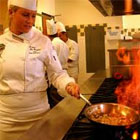I spent the five happiest years of my life in a morgue. As a forensic scientist in the Cleveland coroner’s office I analyzed gunshot residue on hands and clothing, hairs, fibers, paint, glass, DNA, blood and many other forms of trace evidence, as well as crime scenes. Now I'm a certified latent print examiner and CSI for a police department in Florida. I also write a series of forensic suspense novels, turning the day job into fiction. My books have been translated into six languages.
But what sample were they testing? What piece of evidence were they analyzing in the gas chromatograph?
Sorry it took me so long, I was out of town at a conference. But I really don’t know for sure—it’s up to the hiring lab, what they want. I would think a 4 year in Biology with as many Forensic classes as you can get would be best, but a better way to guess would be to call all the labs you’re considering and ask them.Best of luck!
They would most likely have rope fibers on their hands whether they hung themselves or were strangled. No, the furrow will usually get less deep and maybe disappear, depending on how tight the rope is, toward the spot where the knot is since it is usually higher up on the body as gravity pulls the body downward. As far as I know the location of the knot will depend on where it’s tied, if it’s slid around before suspension occurs, and the structure of the knot (if it slips or not). Being right or left handed shouldn’t make a difference therefore.
That determination is made by the pathologist doing the autopsy, and there are a number of ways--body temperature, rate of decomposition, rigor mortis, but it will be an estimate, not the precise number that you might see on TV. All those things can depend on the environment where the body is, temperature, exposure, physical characteristics of the victim, medical conditions etc. Entomologists can help if there is distinct bug activity at the scene as well.
Hope that helps!
Parcel Delivery Mailman
 Does labeling a package "fragile" actually lead to you handling it with more care?
Does labeling a package "fragile" actually lead to you handling it with more care?
EMT
 Does your crew ever fake an emergency to slice through traffic?
Does your crew ever fake an emergency to slice through traffic?
Chef
 Has anyone ever found anything gross in their food on your watch?
Has anyone ever found anything gross in their food on your watch?
I'll email you.
Sorry, but I really don't know. You'd have to ask a pathologist. I imagine it might depend on how long after death the person was in the water.
Hi, sorry I didn’t get back to you sooner. Again, titles and job requirements aren't uniform, so the only way to know is to call the crime labs in your area or whereever you might be interested in working and ask them. You can also go on the websites for professional organizations such as the American Academy of Forensic Sciences and check out their job vacancy postings and see what the various positions require. Good luck.
-OR-
 Login with Facebook
Login with Facebook (max 20 characters - letters, numbers, and underscores only. Note that your username is private, and you have the option to choose an alias when asking questions or hosting a Q&A.)
(A valid e-mail address is required. Your e-mail will not be shared with anyone.)
(min 5 characters)
By checking this box, you acknowledge that you have read and agree to Jobstr.com’s Terms and Privacy Policy.
-OR-
 Register with Facebook
Register with Facebook(Don't worry: you'll be able to choose an alias when asking questions or hosting a Q&A.)